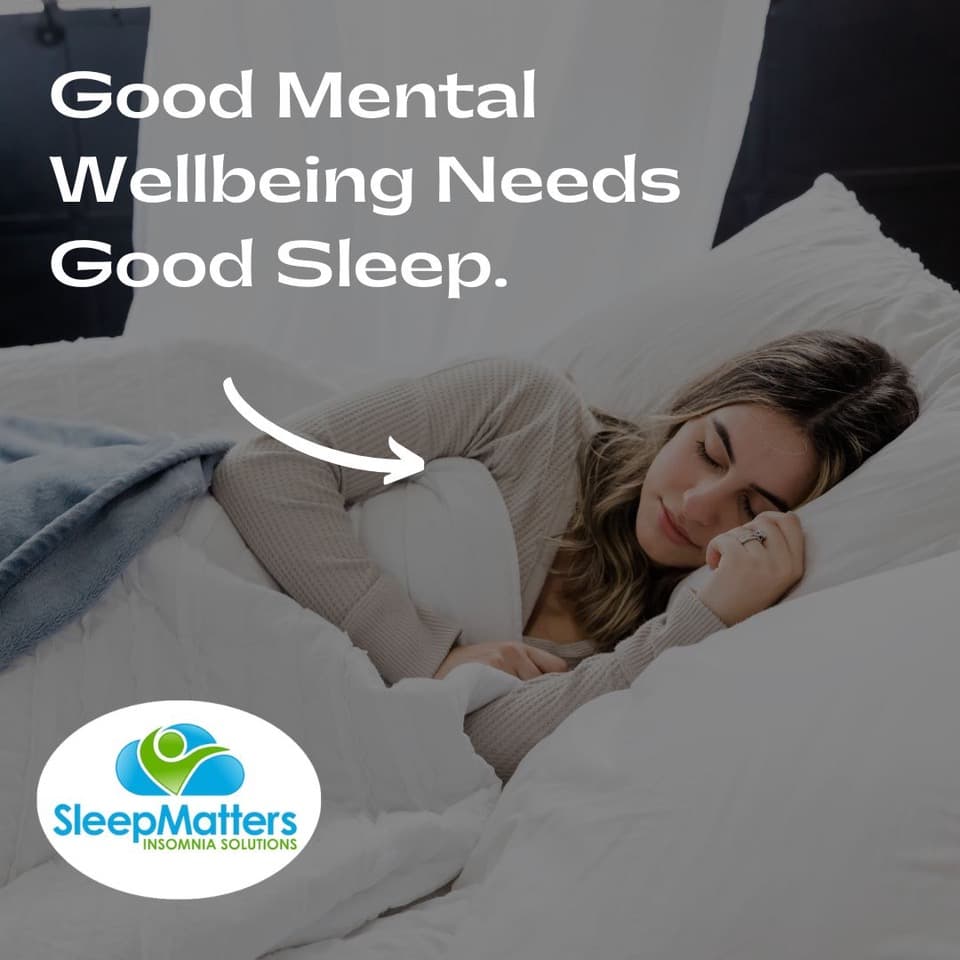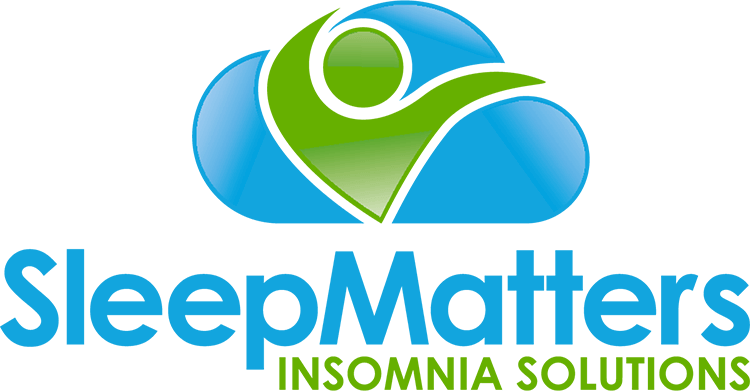Key takeaways
- Insomnia disorder is very common, and even more so in people with mental health conditions.
- Insomnia can increase the risk and severity of mental health struggles.
- Cognitive Behaviour Therapy-Insomnia (CBT-I) is typically a short treatment and is the recommended first line treatment for insomnia.
- Treating insomnia has beneficial impacts not just for insomnia but on co-existing mental health conditions.

Insomnia, a common sleep disorder characterised by difficulty falling or staying asleep, is intricately linked to mental health conditions. The research of Dr Melissa Ree, Clinical Psychologist at Sleep Matters in Perth, examines the profound impact of insomnia on mental health outcomes and the effectiveness of Cognitive Behaviour Therapy-Insomnia (CBT-I) in addressing these challenges.
Let’s explore the complex relationship between insomnia and mental health, the role of CBT-I in treatment, and how the team at Sleep Matters in Perth can help you deal with these issues.
Understanding the insomnia-mental health connection
About 10 to 15% of adults in Australia have insomnia disorder, while 38% may experience symptoms at any given time. Insomnia and mental health are deeply connected; insomnia can worsen mental health conditions, and mental health issues can make insomnia more likely. In fact, insomnia is the most common symptom listed in the DSM-V, which is a detailed guide of all mental health diagnoses.
However, we know that insomnia is not merely a symptom of mental health concerns. Studies show it can actually lead to or worsen these problems, increasing the risk, severity, and chance of them coming back. When insomnia becomes persistent, even if it was initially triggered by a mental health issue, it develops its own mechanisms that continue even after the mental health problem is addressed. For example, people who have gotten over depression often still struggle with insomnia. This tells us that just treating the mental health condition might not be enough to fix the sleep problems.
For more information, visit the Sleep Foundation website.
The link between sleep problems and mental health might be due to changes in how our brain cells connect and learn. This shows why special treatments like CBT-I are important.
The role of CBT-I in insomnia treatment
Cognitive Behaviour Therapy-Insomnia (CBT-I) is recommended as the first-line treatment for insomnia due to its effectiveness and minimal adverse effects. Treatment guidelines tell us that insomnia should be treated with CBT even if there are other conditions present. This short-term structured therapy aims to help individuals modify behaviours and thoughts that impact their ability to sleep well, typically in just 4-8 sessions. By addressing factors such as sleep regulation processes (homeostatic sleep drive and circadian rhythm), arousal impact on sleep, anxiety reduction, and stress management, CBT-I empowers individuals to improve their sleep patterns and overall wellbeing.
About 80% of people who try CBT-I get better and stay better for a long time, even if they have other mental health issues. CBT-I can also work well with sleep medicines and can help people use less of those medicines over time.
Benefits of CBT-I beyond sleep
The benefits of CBT-I extend beyond improving sleep quality. Research indicates that CBT-I can amplify responses to antidepressants, reduce the risk of mania in bipolar patients, enhance psychological therapies for PTSD, reduce psychotic symptoms, and improve mood, anxiety levels, and overall quality of life.
Additionally, treating insomnia alongside conditions like Obstructive Sleep Apnea (OSA) can directly benefit OSA management and indirectly reduce the risk of depression associated with OSA.
In our clinic, we’ve noticed that individuals often find seeking treatment for insomnia less daunting and stigmatising than addressing other mental health concerns. CBT-I serves as a gentle introduction to the therapeutic process, offering a pathway for clients to engage with broader psychological therapy. Interestingly, many clients who initially seek help for insomnia later choose to address other mental health issues they may not have tackled initially. This highlights how CBT-I can serve as a stepping stone towards holistic mental health care, empowering individuals to take charge in ways they might not have considered before.

How our psychologists at Sleep Matters in Perth can assist
Sleep Matters is one of the services offered by J&R Clinical Psychology, and it is dedicated to providing comprehensive support for individuals struggling with insomnia and related mental health difficulties. Our tailored approach includes:
- Screening for insomnia: Using validated tools like the Insomnia Severity Index (ISI) to identify insomnia disorders early on.
- Personalised treatment plans: Developing individualised treatment strategies that integrate CBT-I with other therapeutic modalities.
- Holistic care: Addressing underlying issues contributing to sleep disturbances and mental health conditions through collaborative interventions.
- Empowerment through therapy: Equipping clients with coping strategies and tools to manage their mental health effectively.
By integrating evidence-based practices like CBT-I into our clinical approach, we aim to empower individuals to better manage their mental health by addressing insomnia comprehensively.
For more information on how Sleep Matters can support you in managing insomnia and enhancing your mental health, please contact us for personalised assistance.
References:
Freeman, D., et al. “Sleep disturbance and psychiatric disorders: the non-specific as essential in understanding and treating mental ill health.” Lancet Psychiatry 7.7 (2020).
Ree, MJ., Moira J., Cunnington D. “Australasian Sleep Association position statement regarding the use of psychological/behavioral treatments in the management of insomnia in adults.” Sleep medicine 36 (2017): S43-S47.
Morin, Charles M., et al. “World sleep society international sleep medicine guidelines position statement endorsement of “behavioral and psychological treatments for chronic insomnia disorder in adults: An American Academy of sleep medicine clinical practice guidelines”.” Sleep Medicine (2023).
Ree, MJ., Richardson C. “Insomnia disorder update: the benefits of screening and treatment for this common presentation.” Internal Medicine Journal 51.11 (2021): 1798-1805
Blog overview